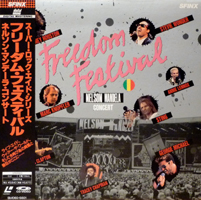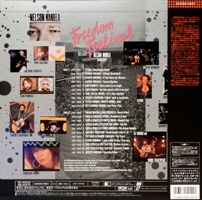|
Additional
comments |
Wembley Stadium on 11th June 1988 was the venue
for a unique gathering of musicians and performers from all over the world
who under the banner of Artists Against Apartheid paid tribute to Nelson
Mandela for his 70th Birthday. An audience estimated to be well over half a
billion people in some 63 countries participated in an event with a simple
compelling message: "Free Nelson Mandela". Dire Straits appeared as the
closing act of that unforgettable day with Eric Clapton on second guitar.
Until today, it was probably the most important and powerful concert of the
Dire Straits history. Amazing version of Brothers in arms!
12 inch LaserDisc, NTSC format, Japanese edition
including seperate info-sheet and Obi.
|
|
Extra information Obi |
An Obi strip is traditionally a strip of paper
looped around the left side or folded over the top of Japanese LP albums.
Obi strips are also found folded over the left side of music CD's, video
games, DVD's and even on the covers of books when they are sold new. The
Japanese word "Obi" refers to the traditional sash or belt worn with a
kimono. The features of the obi strip include the title of the product
usually in phonetic Japanese, the track listings, other information such as
price, catalog number and information on related releases or artists from
that same record company.
|
|
Laserdisc information |
The LaserDisc (LD) is an obsolete home video disc
format, and was the first commercial optical disc storage medium. Initially
marketed as Discovision in 1978, the technology was licensed and sold as
Reflective Optical Videodisc, Laser Videodisc, Laservision, Disco-Vision,
DiscoVision, and MCA DiscoVision until Pioneer Electronics purchased the
majority stake in the format and marketed LaserDisc in the mid to late
1980's. While LaserDisc produced a consistently higher quality image than
its rivals, the VHS and Betamax systems, the laserdisc never obtained more
than a niche market with videophiles in America. In Europe, it remained
largely an obscure format. It was, however, much more popular in Japan and
in the more affluent regions of South East Asia, such as Hong Kong and
Singapore. Laserdisc was the prevalent rental video medium in Hong Kong
during the 1990's. The technology and concepts provided with the Laserdisc
would become the forerunner to Compact Discs and DVDs. |

